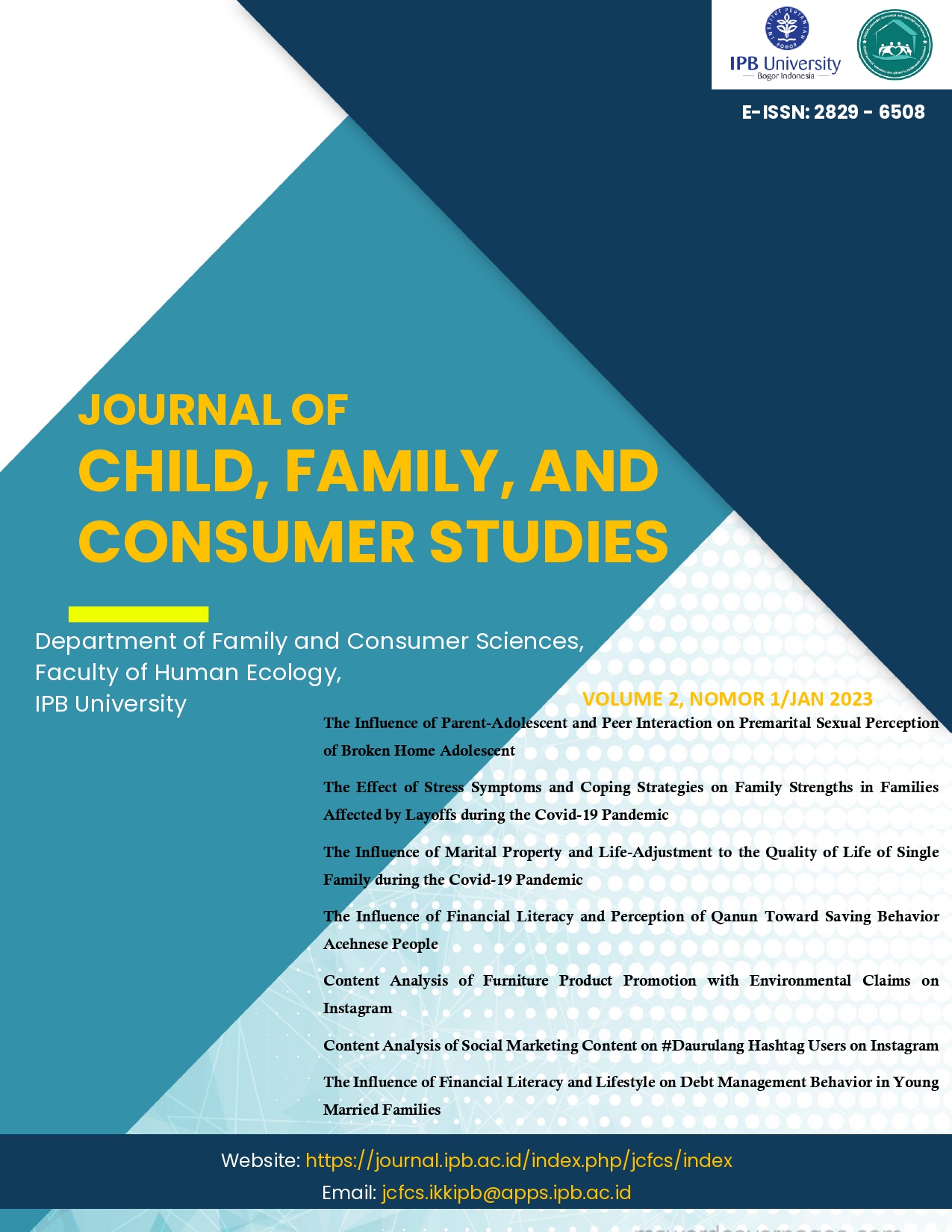THE EFFECT OF STRESS SYMPTOMS AND COPING STRATEGIES ON FAMILY STRENGTHS IN FAMILIES AFFECTED BY LAYOFFS DURING THE COVID-19 PANDEMIC
Abstract
Layoffs during the Covid-19 pandemic resulted in family stress because there was no income to meet needs so families needed coping strategies in order to maintain their families. The purpose of this study is to analyze the relationship and influence of family characteristics, stress symptoms, and coping strategies on family strengths in families affected by layoffs during the Covid-19 pandemic. The research design used a cross-sectional study. The sampling technique used voluntary sampling with a total of 50 samples. This study uses primary data by distributing online questionnaires using Google Forms. The data obtained were analyzed using the Statistical Package for Social Science (SPSS) for windows version 22. Data analysis in this study was descriptive analysis, Spearman correlation, Pearson correlation, and multiple linear regression. The results showed that there was a significant positive relationship between wife's education and emotional-focused coping. Stress symptoms have a significant positive relationship with problem-focused coping and a significant negative relationship with family strength. Emotional-focused coping has a significant positive relationship with family strength. Regression analysis shows that emotional-focused coping has a significant positive effect on family strength. Symptoms of stress have a significant negative effect on family strength. Families affected by layoffs during the Covid-19 pandemic should be able to minimize symptoms of physical stress by doing breathing relaxation. The related government is also expected to provide family empowerment through increasing entrepreneurial knowledge and skills.
References
BKKBN] Badan Kependudukan dan Keluarga Berencana Nasional. (2020). Survei Kondisi Keluarga Pada Masa Pandemi Covid-19. [diunduh 2021 Mei 25]. Tersedia pada: https://cis.bkkbn.go.id/latbang/?wpdmpro=survei-kondisi-keluarga-pada-masa-pandemi-covid-19-2
Carver, C. S., Scheier, M. F., Weintraub, J. K. (1989). Assessing coping strategies: a theoretically based approach. Journal of Personality and Social Psychology, 56(2), 267–283. doi:10.1037/0022-3514.56.2.267.
Claudia, N. (2018). Pengaruh dukungan sosial dan interaksi keluarga terhadap ketahanan keluarga dengan istri sebagai pencari nafkah utama [skripsi]. Bogor: Institut Pertanian Bogor.
Donny, A. (2016). Kekerasan dalam rumah tangga terhadap istri (studi pada lima permasalahan ekonomi dalam keluarga di Kota Samarinda Kalimatan Timur). eJournal Sosiatri-Sosiologi, 4(4), 58–74. https://ejournal.ps.fisip-unmul.ac.id/site/wp-content/uploads/2016/11/E-Jurnal%20Arnoldus%20Donny%20(11-15-16-05-00-06).pdf
Fala, M., Sunarti, E., Herawati, T. (2020). Sumber stres, strategi koping, gejala stres, dan kepuasan perkawinan pada istri bekerja. Jurnal Ilmu Keluarga dan Konsumen, 13(1), 25–37. doi:10.24156/jikk.2020.13.1.25.
Firdaus, F., Sunarti, E. (2009). Hubungan antara tekanan ekonomi dan mekanisme koping dengan kesejahteraan keluarga wanita pemetik teh. Jurnal Ilmu Keluarga dan Konsumen, 2(1), 21–31. https://journal.ipb.ac.id/index.php/jikk/article/view/5160/11483
Ghaffari, M., Fatehizade, M., Ahmadi, A., Ghasemi, V., Baghban, I. (2013). Predictors of family strength: the integrated spiritual-religious/resilient perspective for understanding the healthy/strong family. Iran. Journal of Psychiatry and Behavioral Sciences, 7(2), 57–67. https://www.ncbi.nlm.nih.gov/pmc/articles/PMC3939988/
Herawati, T., Pranadji, D. K., Rukmayanti, I. Y. (2012). Dukungan sosial dan ketahanan keluarga peserta dan bukan peserta program nasional pemberdayaan masyarakat (pnpm) mandiri. Jurnal Ilmu Keluarga dan Konsumen, 5(1), 1–10. doi:10.24156/jikk.2012.5.1.1.
Herawati, T., Tyas, F. P. S., Trijayanti, L. (2017). Tekanan ekonomi, strategi koping, dan ketahanan keluarga yang menikah usia muda. Jurnal Ilmu Keluarga dan Konsumen, 10(3), 181–191. doi:10.24156/jikk.2017.10.3.181.
Jenaabadi, H. (2014). The study and comparison of stress levels and coping strategies in parents of exceptional (mentally retarded, blind and deaf) and normal children in Zahedan. Procedia - Social and Behavioral Sciences, 114, 197–202. doi:10.1016/j.sbspro.2013.12.684.
Judge, S. L. (1998). Parental coping strategies and strengths in families of young children with disabilities. Family Relations, 47(3), 263-268. doi:10.2307/584976.
Kompas. (2021). Sejarah Hari Ini: 2 Maret 2020, Warga Depok Terkonfirmasi sebagai Pasien Pertama Covid-19. Tersedia pada: https://megapolitan.kompas.com/read/2021/03/02/05250091/sejarah-hari-ini-2-maret-2020-warga-depok-terkonfirmasi-sebagai-pasien?page=all.
Krysan, M., Moore, K. A., Zill, N. (1990). Research on successful families. US Departement of Health and Human Service, 1-23. https://aspe.hhs.gov/basic-report/research-successful-families
Lavee, Y., McCubbin, H. I., Patterson, J. M. (1985). The double abcx model of family stress and adaptation: an empirical test by analysis of structural equations with latent variables. Journal of Marriage and the Family, 47(4), 811-825. doi:10.2307/352326.
McCubbin, H. I., Joy, C. B., Cauble, A. E., Comeau, J. K., Patterson, J. M., Needle, R. H. (1980). Family stress and coping: a decade review. Journal of Marriage and the Family, 42(4), 855. doi:10.2307/351829.
Ngadi, N., Meliana, R., Purba, Y. A. (2020). Dampak pandemi covid-19 terhadap phk dan pendapatan pekerja di Indonesia. Jurnal Kependudukan Indonesia, 0(0), 43-48. doi:10.14203/jki.v0i0.576.
Octaviani, M., Herawati, T., Tyas, F. P. S. (2018). Stres, strategi koping dan kesejahteraan subjektif pada keluarga orang tua tunggal. Jurnal Ilmu Keluarga dan Konsumen, 11(3), 169–180. doi:10.24156/jikk.2018.11.3.169.
Oktaria, R., Pranaji, D. K., Muflikhati, I. (2015). Sumber stres, strategi koping, dan tingkat stres pada buruh perempuan berstatus menikah dan lajang. Jurnal Ilmu Keluarga dan Konsumen, 8(3), 133–141. doi:10.24156/jikk.2015.8.3.133.
Puspitawati, H. (2017). Gender dan Keluarga. Bogor: IPB Press.
Radloff, L. S. (1977). The CES-D scale: a self-report depression scale for research in the general population. Applied Psychological Measurement, 1(3), 385-401. https://conservancy.umn.edu/bitstream/handle/11299/98561/v01n3p385.pdf
Rajeev, S. P., Kunjachan, D. (2014). Building family resilience-a social work approach. International Journal of Social Work and Human Service Practice, 2(6), 250-256. http://www.academia.edu/download/35988319/IJRH8-19290157.pdf
Sangalang, C. C., Jager, J., Harachi, T. W. (2017). Effects of maternal traumatic distress on family functioning and child mental health: an examination of Southeast Asian refugee families in the U.S. Social Science and Medicine, 184, 178–186. doi:10.1016/j.socscimed.2017.04.032.
Sosu, E. M., Schmidt, P. (2017). Economic deprivation and its effects on childhood conduct problems: the mediating role of family stress and investment factors. Frontiers in Psychology, 8, 1580. doi:10.3389/fpsyg.2017.01580.
Sumakul, Y., Ruata, S. (2020). Kesejahteraan psikologis dalam masa pandemi covid-19. Journal of Psychology" Humanlight", 1(1), 1-7. http://ejournal-iakn-manado.ac.id/index.php/humanlight/article/view/302
Sunarti, E. (2001). Studi ketahanan keluarga dan ukurannya: telaah kasus pengaruhnya terhadap kualitas kehamilan [disertasi]. Bogor: Institut Pertanian Bogor.
Tati. (2004). Pengaruh tekanan ekonomi keluarga, dukungan sosial dan kualitas perkawinan terhadap pengasuhan anak [tesis]. Bogor: Institut Pertanian Bogor.
Wulan, D. K., & Chotimah, K. (2017). Peran regulasi emosi dalam kepuasan pernikahan pada pasangan suami istri usia dewasa awal. Jurnal Ecopsy, 4(1), 58-63. doi:10.20527/ecopsy.v4i1.3417.
Yang, H. J., Kim, G., Lee, K. U., Lee, J., Cheong, H. K., Choi, B. Y., Lee, S. Y. (2018). Changes in the levels of depressive symptoms and anxiety in Ansan city after the 2014 Sewol ferry disaster. Journal of Affective Disorders, 241, 110–116. doi:10.1016/j.jad.2018.07.066.










